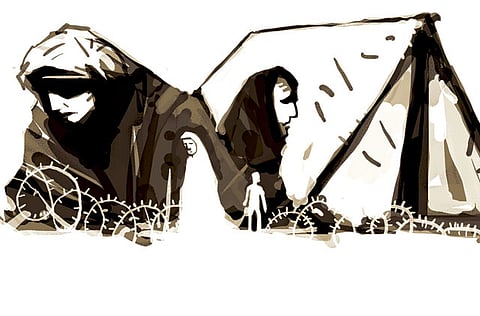Don't run away from the problem of refugees
World's most vulnerable and disenfranchised people need the rich and powerful to translate words into action

SHUT UP! LOOK DOWN. GIVE ME YOUR POSSESSIONS!
These were the words screamed into my face at Davos this year, whilst participating in the Refugee Run — an hour-long experience which simulates a refugee camp in ‘a generic country'.
Within this hour you are given a character to play (I was a 14-year-old girl). As a refugee you are ripped from your home, forced to flee your country, lose your identity and step into a very uncertain future. You give your possessions in exchange for an empty bowl so that you can then join the never-ending line for limited food rations. At night you are surrounded by men with guns shouting in a foreign language. You are forced to face ethnic conflict, homelessness, corruption and disempowerment.
Discombobulating. Humiliating. Terrifying. These were some of the words that were used by participants in the de-brief after the enactment. Then you hear from real refugees: such as Raphael Mwandu of Congo who was separated from his family; Frankie who saw needless death because conditions were so overcrowded there wasn't even room to sit down in a cell; a young boy who was forced to kill, torture and rape otherwise it was clearly illustrated to him that the rest of his family would be killed. It is traumatic, so who would blame you for wanting to run away, rather than participate in the Run?
The Refugee Run is organised by the United Nations High Commissioner for Refugees (UNHCR) and the NGO Crossroads Foundation, who run over 30 such simulations and distribute Hong Kong's unwanted resources to the world. According to the UN there are 43.3 million displaced people around the world, and 10 million refugees have lost everything. But still, these are just words. As per an old adage ‘To understand a man is to walk a mile in his shoes.' Thus the High Commissioner Antonio Guterres called the Refugee Run "enlightening".
The World Economic Forum is about the rich and powerful and the Refugee Run sets up in the idyllic Swiss village of Davos to give voice to the world's most vulnerable and disenfranchised.
But why are we even having this conversation in a mock refugee camp? Why not in the Congress Centre, where heads of state and the most powerful chief executives of the corporate world gather to make a difference in the world? Discussions around world poverty, water and even happiness are taking place, but the topic of refugees has not been touched. I learned that it is because the subject is highly political and perhaps cannot be easily compartmentalised. Although it is the fourth year that the Refugee Run has set up in Davos, it is now situated on the fringes of the village. Though the number of attendees is increasing, they were generally young NGOs or social entrepreneurs.
Absence of power elite
"This year there were very few big names from the private sector," said Riba Stevens of Crossroads Foundation. In the past up to 10 per cent of the 2,500 of Davos participants had attended, including Sir Richard Branson, Jimmy Wales of Wikipedia and United Nations Secretary-General Ban Ki-moon. But this year none of the powerful elite had the extra 10 minutes it took to get up the hill to pretend to be a refugee. However, for some countries refugees are THE issue, as was made clear by Palestinian President Mahmoud Abbas. "The refugee issue is imperative and will always be part of any bi- or multi-lateral discussions with us. Seventy per cent of Palestinians are refugees, so without solving the refugee problem we will never resolve the issue of a Palestinian state."
There are 7 million Palestinian refugees abroad and those living within the Occupied Territories are in the care of the United Nations Relief and Works Agency (UNWRA) for Palestine Refugees in the Near East which was formed in 1949, two years before the birth of UNHCR.
Abbas sees the importance of the refugee plight, and his Foundation and the Palestine Investment Fund recently launched an economic empowerment programme to support small enterprises in the Palestinian refugee camps in Lebanon. Despite this, and given the growing refugee problem, paralleled with the increasing cost of living and juxtaposed against the global economic climate, UNWRA has seen a decline in its service.
Therefore, the UNHCR's target budget has significantly increased, rising to $3.5 billion for 2012. This may seem like a huge amount of money, but it equates to $103 per year per person. "Thankfully," says Melissa Fleming of UNHCR, "our Gulf offices, such as the UAE office is one of the most generous in the world."
This year Saleh Saeed, CEO of the Islamic Relief Worldwide also attended the Refugee Run. We noticed that although the run was meant to be in a ‘generic country', the Quran would always be played to simulate early morning.
I realised that subconsciously. I was picturing myself as a Libyan girl, highlighting how subtly effective the Refugee Run is. In real life, Libyans ran to their neighbours, and Tunisia and Egypt illustrated exceptional generosity as hosts. However, refugees should not need be on our doorstep for us to address the problem.
Education about such issues must begin at school and around the dinner table so that we are all invested in finding the solutions and collaborate, and the leaders of tomorrow do not need a Refugee Run.
Mandeep Rai is an international journalist, entrepreneur and is currently working on the Global Business Oath.



